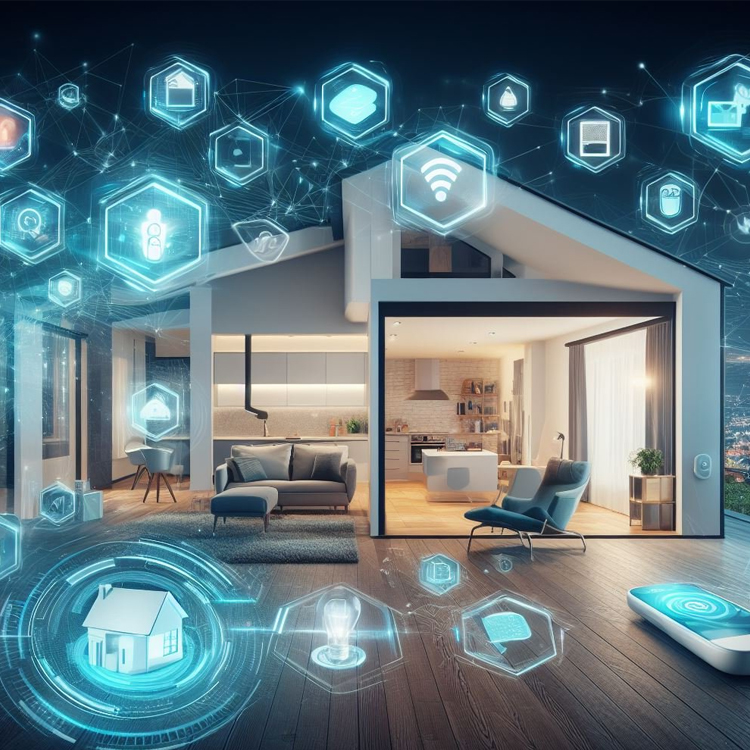In today’s fast-paced world, creating a modern home that caters to convenience, efficiency, and security is more achievable than ever with smart living solutions. These innovative technologies seamlessly integrate into your daily routines, offering unprecedented control over your home’s environment and functionality. From automated lighting and smart thermostats to advanced security systems and intelligent appliances, the following ten smart living solutions will transform your living space into a state-of-the-art sanctuary tailored to your needs. Embrace the future of home automation and discover how these smart solutions can enhance your modern home.

Smart Lighting Systems
a. Automated Lighting Control
Automated lighting control allows you to program your lights to turn on or off based on specific criteria, such as the time of day, occupancy, or ambient light levels. For example, you can set your living room lights to gradually dim as bedtime approaches or have your porch light turn on automatically at sunset. This automation enhances convenience and can contribute to energy savings by ensuring lights are only on when needed.
b. Voice-Controlled Lights
With integration into popular virtual assistants like Amazon Alexa, Google Assistant, or Apple Siri, you can control your lighting with simple voice commands. Whether you’re in the middle of cooking and need more light or you’re ready to settle in for a movie and want to dim the lights, voice control offers hands-free convenience. Additionally, this feature can be especially beneficial for individuals with mobility issues, providing an easier way to manage their home environment.
Smart Thermostats
a. Energy Efficiency
Smart thermostats are created to maximize the efficiency of heating and cooling systems in your home. learning your schedule and preferences to maintain a comfortable environment while minimizing energy consumption. By adjusting the temperature when you’re away or asleep, these devices ensure that energy isn’t wasted, resulting in lower utility bills. Many smart thermostats also provide energy usage reports, helping you identify ways to further reduce consumption.
b. Remote Access
One notable feature of smart thermostats is their capability to manage your home’s temperature remotely via a smartphone application. Whether you’re at work, on vacation, or just lounging on the couch, you can adjust the thermostat to ensure your home is at the perfect temperature when you arrive. This remote access is particularly useful for managing unexpected changes in your schedule.
Smart Security Systems
a. Real-Time Alerts
Smart security systems provide real-time alerts for any unusual activity detected in or around your home. These alerts can be sent directly to your smartphone, allowing you to take immediate action if necessary. Instant notifications keep you informed about potential security threats, even when you are not at home.
b. Integration with Other Smart Devices
Integrating your security system with smart lighting can enhance its effectiveness. For example, motion sensors can trigger outdoor lights to turn on when movement is detected, deterring potential intruders. This integration adds an extra layer of security and convenience.
Smart Locks
a. Keyless Entry
Smart locks allow you to unlock your door using pin codes entered on a keypad. This removes the requirement for physical keys, thereby lowering the risk of compromised home security due to lost or stolen keys. You can assign unique pin codes to family members, friends, or service providers, each with customizable access privileges and expiration dates.
b. Remote access and monitoring
Smart locks often feature Wi-Fi or Bluetooth connectivity, allowing them to communicate with your smartphone or other smart devices. This connectivity enables remote access and monitoring, giving you the ability to manage your home’s security even when you’re away.
Smart Appliances
a. Enhanced Control and Monitoring
Smart appliances allow you to control and monitor their operation remotely using a smartphone or tablet. Whether you’re at home, at work, or traveling, you can adjust settings, start or stop cycles, and receive notifications about the appliance’s status.
b. Energy Efficiency
Smart appliances often include energy monitoring features that track energy consumption in real-time. This data allows you to identify energy-intensive cycles or habits and make adjustments to reduce your overall energy usage and utility costs.
Conclusion, Implementing smart living solutions in your modern home can significantly enhance your lifestyle by providing convenience, security, and energy efficiency. From smart lighting and thermostats to advanced security systems and smart appliances, these technologies offer a more connected and intuitive living experience. Embrace the future of home automation and transform your house into a smart Modern home that adapts to your needs and preferences.